

Self-reflection and academic performance: is there a relationship? Self-reflection and academic performance: is there a relationship? Stewart 2015. Flavell%20(1979) Teaching Excellence in Adult Literacy (TEAL) Metacognition is one’s ability to use prior knowledge to plan a strategy for approaching a learning task, take necessary steps to problem solve, reflect on and evaluate results, and modify one’s approach as needed. It helps learners choose the right cognitive tool for the task and plays a critical role in successful learning.
Metacognition and Self-Talk. The MC at the University of Michigan’s reunion dinner encouraged audience members to reveal the most significant take-away from their undergraduate nursing education.
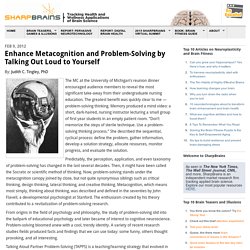
The greatest benefit was quickly clear to me — problem-solving thinking. Memory produced a mind video: a short, dark-haired, nursing instructor lecturing a small group of first year students in an empty patient room. “Don’t memorize the steps of sterile technique. Use a problem-solving thinking process.” OECD Article. Today’s post is by Anne-Lise Prigent the editor in charge of education publications at OECD Publishing French poet Paul Valéry once expressed his love for mathematics: “I worship this most beautiful subject of all and I don’t care that my love remains unrequited.”
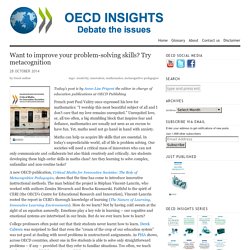
Unrequited love, or, all too often, a big stumbling block that inspires fear and defiance, mathematics are usually not seen as an excuse to have fun. Yet, maths need not go hand in hand with anxiety. Maths can help us acquire life skills that are essential. In today’s unpredictable world, all of life is problem solving. A new OECD publication, Critical Maths for Innovative Societies: The Role of Metacognitive Pedagogies, shows that the time has come to introduce innovative instructional methods. College professors often point out that their students never learnt how to learn. Yet, there is an engine we can use for that and it is called metacognition, which means “thinking about your thinking”, and regulating it. Audio Player. Information on Attention Deficit Symptoms, Diagnosis, Treatment, Parenting, and More. Slide 1 of 3 comstock/thinkstock Metacognition is the ability to stand back and see oneself when doing a task.
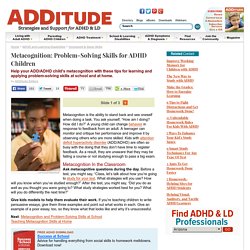
You ask yourself, “How am I doing? How did I do?” A young child can change behavior in response to feedback from an adult. Metacognition In the Classroom Ask metacognitive questions during the day. Give kids models to help them evaluate their work. Next: Metacognition and Problem-Solving Skills at SchoolTeaching Metacognition Skills at Home slide 1 2 3 next » Share your comments, find solutions and support on ADDConnect!
NCNS Article. “When teachers cultivate students’ abilities to reflect on, monitor, and evaluate their learning strategies, young people become more self-reliant, flexible, and productive.” – Developmental psychologist, Marilyn Price-Mitchell (2015) As teachers think about how to equip all students to be successful in and beyond the classroom, research suggests that one key component of student success -– metacognition –- deserves our attention.
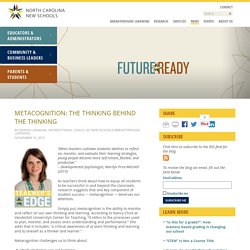
Simply put, metacognition is the ability to monitor and reflect on our own thinking and learning. According to Nancy Chick at Vanderbilt University’s Center for Teaching, “it refers to the processes used to plan, monitor, and assess one’s understanding and performance.” She adds that it includes, “a critical awareness of a) one’s thinking and learning and b) oneself as a thinker and learner.”
Metacognition and Professional Development. In my 15 years in higher ed, I’ve read and heard lots of ideas and suggestions on how to help students, and taught and given lots of advice to students.
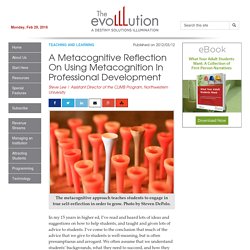
I’ve come to the conclusion that much of the advice that we give to students is well-meaning, but is often presumptuous and arrogant. We often assume that we understand students’ backgrounds, what they need to succeed, and how they define success. Let me explain myself. Since I’ve worked with diverse groups of students, I’ve tried to learn what others are doing. Much of the advice that I have read and heard (e.g. survival guides, secrets of success in college, etc) is geared only for specific student populations, or is too generic and obvious (e.g. simplistic suggestions for students to work hard). A possible objection to this approach of using metacognitive skills might assume that people should already be aware of themselves and how they compare with their classmates.
References. Motivation and Metacognition Article. NCBI "Promoting Student Metacognition" Einstein Quote. Metacognition Vanderbilt University Article. Print Version by Nancy Chick, CFT Assistant Director Thinking about One’s Thinking | Putting Metacognition into Practice.
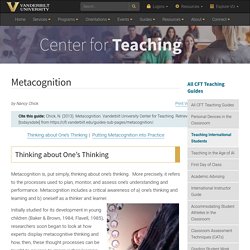
Metacognition and Acadmeic Success pdf.